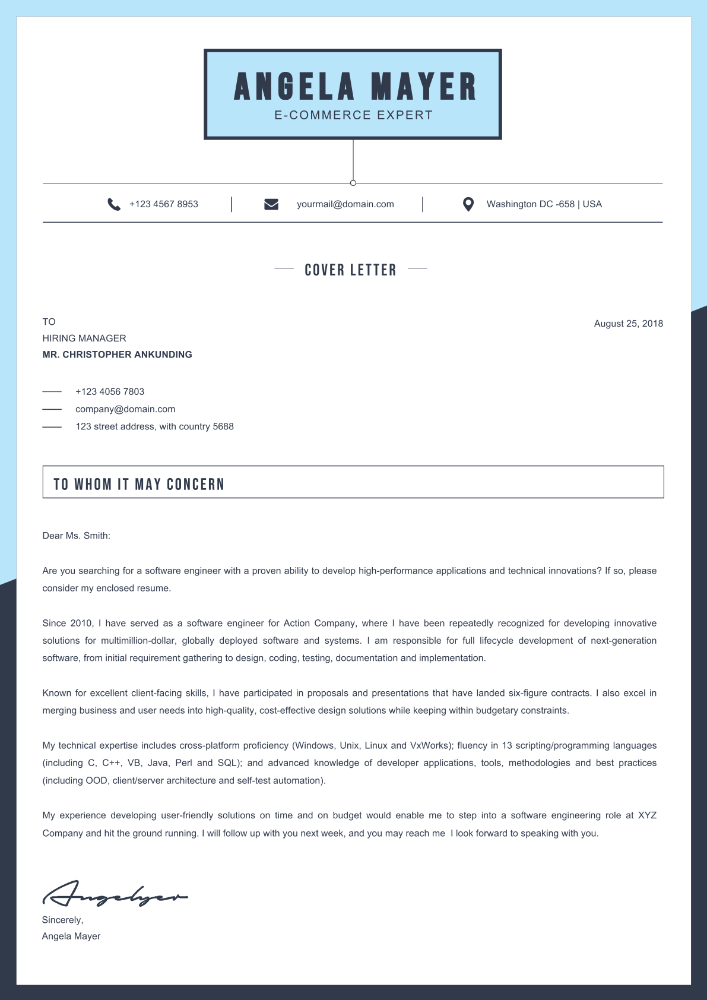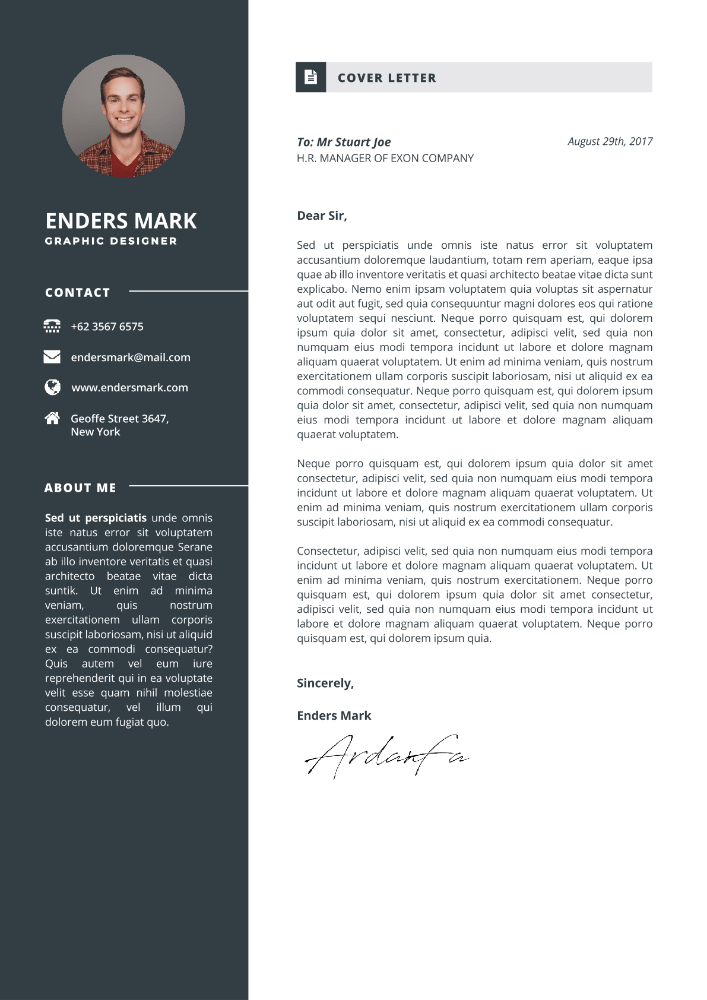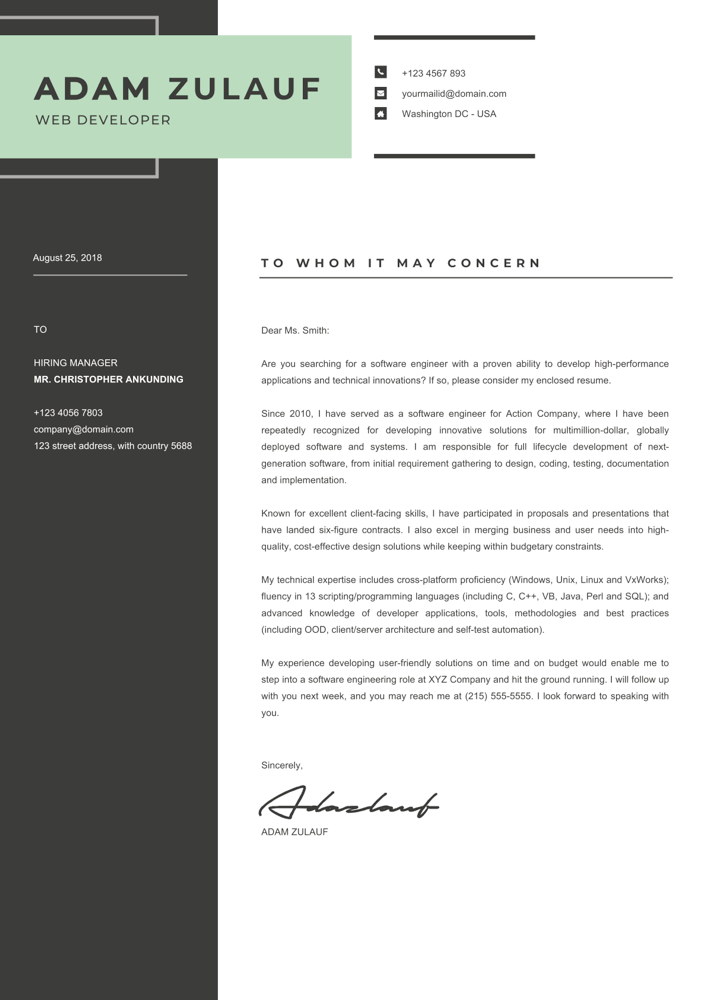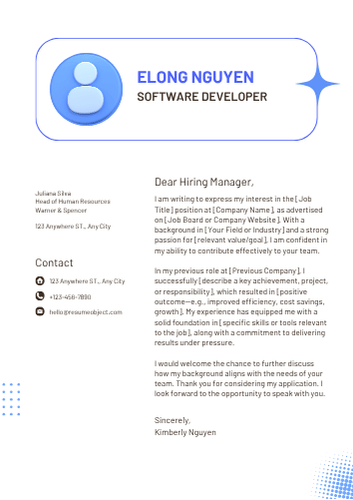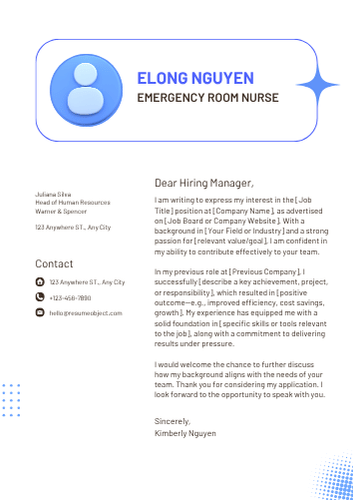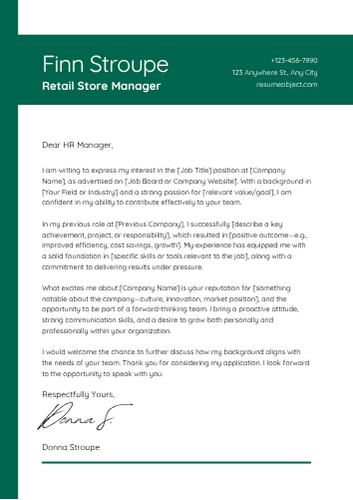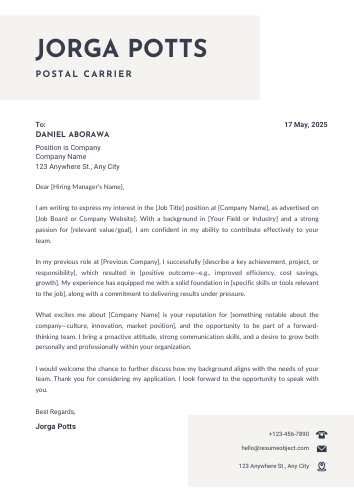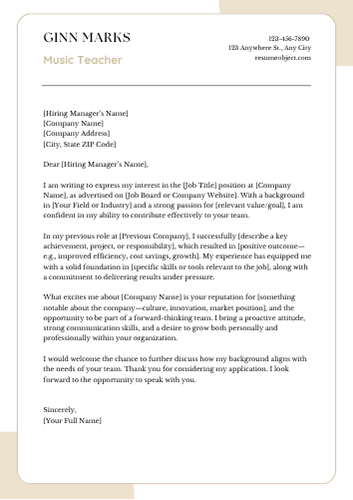Editorial Assistant Cover Letter Examples, Sample Format
Editorial Assistant Cover Letter
In the competitive field of publishing, a standout editorial assistant cover letter can make all the difference. Crafting a compelling letter involves showcasing your skills while aligning with industry standards, making it essential to reference editorial assistant templates and examples that resonate with hiring managers.
Navigating the nuances of the application process requires a keen understanding of effective cover letter formats. By utilizing well-structured samples, you can highlight your qualifications and passion for the role, increasing your chances of landing that coveted interview.
What Makes a Great Editorial Assistant Cover Letter?
A great editorial assistant cover letter highlights relevant skills, showcases passion for publishing, demonstrates attention to detail, and conveys a strong understanding of the role, compelling employers to consider your application.
-
Demonstrate Strong Writing Skills: Showcase my ability to produce clear, engaging, and error-free content that aligns with the publication's voice and style.
-
Highlight Editorial Experience: Emphasize my previous internships and roles where I successfully assisted in editing, fact-checking, and content management.
-
Showcase Attention to Detail: Illustrate my meticulous approach to proofreading and ensuring the accuracy of all written materials before publication.
-
Express Passion for the Industry: Convey my enthusiasm for literature and media, and my commitment to contributing to a dynamic editorial team.
-
Illustrate Adaptability and Teamwork: Highlight my ability to thrive in fast-paced environments and work collaboratively with writers, editors, and other stakeholders.
Discover essential tips and formats for crafting your PCT cover letter. For detailed insights, check out our comprehensive guide on PCT Cover Letter Examples, Sample Format.
Essential Sections of Editorial Assistant Cover Letter
An effective editorial assistant cover letter should include a strong introduction, relevant skills and experiences, specific achievements, and a compelling conclusion that encourages the hiring manager to take action.
-
Contact Information: Begin with your full name, phone number, email address, and LinkedIn profile (if applicable). Ensure this is clear and easy to find at the top of the letter.
-
Salutation: Address the hiring manager or editor by name if possible. Avoid generic greetings like "To Whom It May Concern."
-
Introduction: Start with a strong opening that grabs attention. Mention the position you are applying for and briefly state why you are an ideal candidate.
-
Professional Experience: Highlight relevant experience in editorial work, such as assisting editors, proofreading, fact-checking, or managing content calendars. Use specific examples to demonstrate your skills.
-
Skills and Qualifications: Emphasize key skills such as excellent writing and editing abilities, attention to detail, time management, and familiarity with editorial software or content management systems.
-
Knowledge of the Industry: Show your understanding of the publication’s niche or the media industry. Mention any relevant knowledge that aligns with the company’s mission or audience.
-
Achievements: Include any notable accomplishments, such as successful projects, improvements in editorial processes, or contributions to published works.
-
Personal Attributes: Convey qualities like reliability, teamwork, adaptability, and a passion for the written word, which are crucial for an editorial assistant role.
-
Closing Statement: Reiterate your enthusiasm for the role and the organization. Politely express your desire for an interview and provide your availability.
-
Professional Sign-Off: End with a courteous closing such as “Sincerely” or “Best regards,” followed by your full name.
Similar Cover Letters
Best Editorial Assistant Cover Letter Format
Discover the ideal format for your editorial assistant cover letter, designed to showcase your skills and experience effectively, capturing the attention of hiring managers and increasing your chances of landing an interview.
-
Use a professional font and size: Choose clean, easy-to-read fonts like Arial, Calibri, or Times New Roman in 10-12 point size to ensure clarity and professionalism.
-
Keep margins balanced: Use standard 1-inch margins on all sides to create a neat, uncluttered appearance that enhances readability.
-
Include your contact information at the top: Place your name, phone number, email address, and LinkedIn profile (if applicable) at the top, aligned to the left or center for easy reference.
-
Address the letter to a specific person: Whenever possible, find the hiring manager’s name and use a personalized salutation (e.g., Dear Ms. Smith) to show attention to detail and genuine interest.
-
Use a clear, concise subject line: If submitting via email, include a subject line that specifies the position (e.g., Application for Editorial Assistant Position) to grab attention immediately.
-
Structure with short paragraphs: Break your letter into 3-4 brief paragraphs to improve flow and make it easy for recruiters to scan key points quickly.
-
Align text to the left: Left alignment is standard and ensures your letter looks clean and professional, making it easier to read.
-
Maintain consistent spacing: Use single spacing within paragraphs and double spacing between them to create a balanced, readable layout.
-
Limit length to one page: Keep your cover letter concise and focused, ideally between 250-300 words, to respect the reader’s time and highlight your most relevant qualifications.
-
Use bullet points sparingly: If listing skills or achievements, use bullet points for clarity but avoid overuse to maintain a formal tone.
-
Include a strong closing statement: End with a confident call to action, such as expressing eagerness to discuss your qualifications further, to encourage follow-up.
-
Proofread meticulously: Check for typos, grammar errors, and formatting inconsistencies to ensure your cover letter reflects professionalism and attention to detail.
Entry-Level Editorial Assistant Cover Letter (No Experience)
Looking to kickstart your editorial career? This sample entry-level cover letter showcases your passion for writing and attention to detail, helping you stand out to potential employers in the competitive publishing industry.
Sample #1
[Your Name]
[Your Address]
[City, State, ZIP Code]
[Email Address]
[Phone Number]
[Date]
Hiring Manager
[Company Name]
[Company Address]
[City, State, ZIP Code]
Dear Hiring Manager,
I am writing to express my interest in the Editorial Assistant position at [Company Name], as advertised. Although I am an entry-level candidate with no formal work experience in publishing, I am eager to bring my strong passion for writing, keen attention to detail, and dedication to supporting editorial teams to your organization.
During my academic career, I developed excellent research and organizational skills through various writing projects and group assignments. I am proficient in managing multiple tasks, meeting deadlines, and maintaining high-quality standards—qualities I believe are essential for a successful Editorial Assistant. Additionally, my enthusiasm for the publishing industry and eagerness to learn make me a motivated and adaptable team member.
I am excited about the opportunity to contribute to [Company Name] and support your editorial team in producing engaging, polished content. I am confident that my proactive attitude and commitment to excellence will make me a valuable asset to your company.
Thank you for considering my application. I look forward to the opportunity to discuss how I can contribute to your team.
Sincerely,
[Your Name]
Editorial Assistant Sample Cover Letter (Experienced)
This sample cover letter for a mid-level editorial assistant position demonstrates effective communication skills, highlights relevant experience, and showcases a passion for the publishing industry, making it a valuable resource for job seekers in this field.
Sample #2
[Your Name]
[Your Address]
[City, State, ZIP Code]
[Email Address]
[Phone Number]
[Date]
Hiring Manager
[Company Name]
[Company Address]
[City, State, ZIP Code]
Dear Hiring Manager,
I am writing to express my interest in the Editorial Assistant position at [Company Name], as advertised. With over three years of experience in editorial support and content management, I am confident in my ability to contribute effectively to your dynamic team.
In my previous role at [Previous Company], I honed my skills in content editing, fact-checking, and coordinating with writers and designers to ensure timely publication. My keen eye for detail and strong organizational abilities allowed me to manage multiple projects simultaneously without compromising quality. I am proficient in using content management systems and have a solid understanding of SEO best practices, which I believe will add value to your editorial process.
I am particularly drawn to [Company Name] because of your commitment to innovative storytelling and high editorial standards. I am eager to bring my passion for compelling content and my proactive approach to your team. I thrive in fast-paced environments and am always ready to take initiative to meet deadlines and exceed expectations.
Thank you for considering my application. I look forward to the opportunity to discuss how my background, skills, and enthusiasm align with the needs of your editorial team. Please feel free to contact me at your earliest convenience to schedule an interview.
Sincerely,
[Your Name]
Editorial Assistant Cover Letter (Career Change or Gap in Employment)
Looking to land a senior-level editorial assistant role? Check out this sample cover letter format that highlights your skills, experience, and passion for the industry, making your application stand out to potential employers.
Sample #3
[Your Name]
[Your Address]
[City, State, ZIP Code]
[Email Address]
[Phone Number]
[Date]
Hiring Manager
[Company Name]
[Company Address]
[City, State, ZIP Code]
Dear Hiring Manager,
I am writing to express my enthusiasm for the Editorial Assistant position at [Company Name]. With a strong passion for writing, editing, and content creation, I am eager to bring my skills and fresh perspective to your dynamic team. Although my career path has recently taken a different direction, I am excited to re-enter the publishing world and contribute meaningfully to your editorial projects.
During my previous role as a Marketing Coordinator, I honed my abilities in content management, proofreading, and coordinating with cross-functional teams to deliver polished materials on deadline. These experiences have equipped me with a keen eye for detail and a deep appreciation for clear, compelling communication—qualities I am confident will translate seamlessly into the Editorial Assistant role.
I acknowledge there has been a gap in my employment due to [briefly explain reason, e.g., personal development, family commitments, or further education], during which I actively pursued professional development opportunities including online courses in editing and publishing tools. This period has only strengthened my commitment to a career in editorial work and enhanced my organizational and technical skills.
I am particularly drawn to [Company Name] because of your dedication to innovative storytelling and quality content. I am eager to support your editorial team by managing schedules, assisting with manuscript preparation, and ensuring the highest standards of accuracy and style.
Thank you for considering my application. I look forward to the opportunity to discuss how my background, enthusiasm, and adaptability can contribute to the continued success of your editorial department.
Sincerely,
[Your Name]
Cover Letter Tips to Draft Editorial Assistant Cover Letter
Do
Do: Highlight relevant experience – Emphasize your background in editing, proofreading, or content management to show your suitability for the role.
Do: Showcase strong communication skills – Demonstrate your ability to communicate clearly and effectively, both in writing and verbally.
Do: Tailor the letter to the company – Research the publication or organization and customize your letter to reflect their style and values.
Do: Include specific achievements – Mention quantifiable successes or projects that illustrate your editorial capabilities and attention to detail.
Do: End with a clear call to action – Politely encourage the hiring manager to contact you for an interview or further discussion.
Don't
Don't: Use generic language that fails to highlight your unique skills as an Editorial Assistant; personalize your cover letter to stand out.
Don't: Overlook the importance of proofreading; grammatical errors can undermine your credibility as an Editorial Assistant.
Don't: Focus solely on your education; emphasize relevant experience that showcases your capabilities as an Editorial Assistant.
Don't: Neglect to convey your passion for the role; employers want to see genuine enthusiasm for being an Editorial Assistant.
Don't: Make your cover letter too lengthy; keep it concise to maintain the reader's interest in your application for the Editorial Assistant position.
Download Editorial Assistant Cover Letter Templates
Unlock your potential with our free Editorial Assistant cover letter templates. Designed to impress employers, these customizable formats help you showcase your skills and passion, ensuring your application stands out in a competitive job market. Download now!
FAQs about Editorial Assistant Cover Letter
What should I include in my Editorial Assistant cover letter to stand out?
To stand out in your Editorial Assistant cover letter, include specific examples of relevant experience, highlight your passion for editing and publishing, showcase your attention to detail, and mention any software skills. Personalize your letter by addressing the hiring manager and expressing enthusiasm for the company's mission.
How can I demonstrate my writing skills in my Editorial Assistant cover letter?
To demonstrate your writing skills in your Editorial Assistant cover letter, use clear and concise language, showcase your ability to engage readers, and highlight relevant experiences. Include specific examples of your writing projects, such as articles or edits, to illustrate your proficiency and passion for the role.
What specific experiences should I highlight in my cover letter for an Editorial Assistant position?
Highlight relevant experiences such as internships in publishing, writing or editing roles, and coursework in journalism or communications. Emphasize skills like attention to detail, proficiency with editorial software, and any experience with content management systems. Showcase your passion for storytelling and your ability to meet deadlines effectively.
How do I address my cover letter if I don't know the hiring manager's name?
If you don't know the hiring manager's name, use a general greeting like "Dear Hiring Manager" or "Dear [Company Name] Team." Avoid using "To Whom It May Concern," as it's outdated. Personalizing your cover letter with the company's name shows your genuine interest in the position.
What tone and style are appropriate for an Editorial Assistant cover letter?
An Editorial Assistant cover letter should adopt a professional yet approachable tone. Use clear, concise language while showcasing your enthusiasm for the role. Aim for a balance between formality and personality, reflecting your passion for the publishing industry and your ability to communicate effectively.
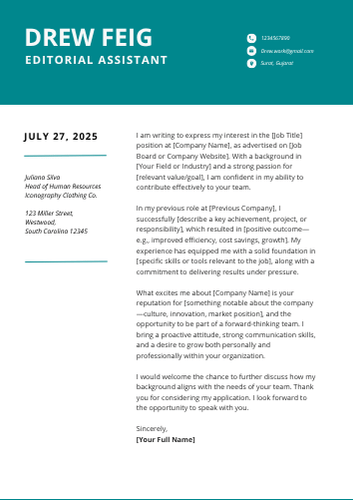
Editorial Assistant Cover Letter
Objective
Detail-oriented and passionate editorial assistant seeking to leverage strong writing and editing skills to support content creation and enhance editorial processes, contributing to a dynamic publishing team.
Summary
Detail-oriented and passionate editorial assistant with strong writing and editing skills. Experienced in content management and research, eager to contribute to your team and enhance publication quality.
Top Required Skills
Strong writing and editing skills
Attention to detail
Time management
Communication skills
Research abilities
Mistakes to Avoid
Failing to tailor the cover letter to the specific publication or role.
Overlooking proofreading for grammatical and spelling errors.
Not highlighting relevant skills and experiences that align with editorial tasks.
Important Points to Add
Strong writing and editing skills
Familiarity with publishing software and tools
Attention to detail and ability to meet deadlines
View More Templates

